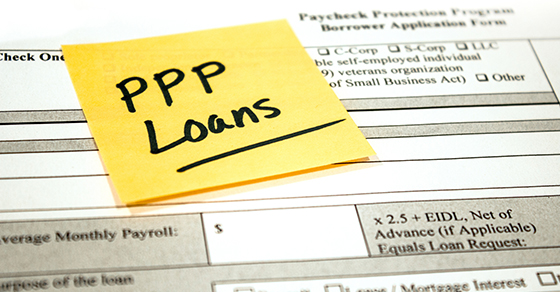The Small Business Administration (SBA) launched the Paycheck Protection Program (PPP) in April to help companies impacted by COVID-19.
Created under the Coronavirus Aid Relief and Economic Security (CARES) Act, the PPP is available to U.S. businesses with fewer than 500 employees.

Originally, the PPP offered eligible participants loans determined by eight weeks of previously established average payroll. If the recipient maintained its workforce, up to 100% of the loan was forgivable if the loan proceeds were used to cover payroll expenses, certain employee health care benefits, mortgage interest, rent, utilities and interest on any other existing debt during the “covered period.” The covered period was for the eight weeks after loan origination.
On June 5, President Trump signed into law the PPP Flexibility Act. The new law makes a variety of important adjustments that ease the rules for borrowers. Highlights include:
Extension of covered period. As mentioned, under the CARES Act and subsequent guidance, the covered period originally ran for eight weeks after loan origination. The PPP Flexibility Act extends this period to the earlier of 24 weeks after the origination date or December 31, 2020.
Adjustment of nonpayroll cost threshold. Previous regulations issued by the U.S. Treasury Department indicated that eligible nonpayroll costs couldn’t exceed 25% of the total forgiveness amount for a borrower to qualify for 100% forgiveness. The PPP Flexibility Act raises this threshold to 40%. (At least 60% of the loan must still be spent on payroll costs.)
Lengthening of period to reestablish workforce. Under the original PPP, borrowers faced a June 30, 2020 deadline to restore full-time employment and salary levels from reductions made between February 15, 2020, and April 26, 2020. Failure to do so would mean a reduction in the forgivable amount. The PPP Flexibility Act extends this deadline to December 31, 2020.
Reassurance of access to payroll tax deferment. The new law reassures borrowers that delayed payment of employer payroll taxes, which is offered under a provision of the CARES Act, is still available to businesses that receive PPP loans. It won’t be considered impermissible double dipping.
Important note: The SBA has announced that, to ensure PPP loans are issued only to eligible borrowers, all loans exceeding $2 million will be subject to an audit. The government may still audit smaller PPP loans, if there is suspicion that funds were misused.
Due to the many details and changing guidelines, it may be difficult to navigate the PPP loan and how to achieve 100% forgiveness. Please contact your Rudler, PSC advisor at 859-331-1717 to help stay informed with any new guidelines or to help start your forgiveness process today.
RUDLER'S TAX MANAGEMENT & PLANNING TEAM
This week's Rudler Review is presented by Maddie Schweitzer, Senior Accountant and Melanie Smart, CPA.
If you would like to discuss your particular tax situation, contact Maddie or Melanie at 859-331-1717.


Rudler PSC has established a Tax Management and Planning Team, a group of professionals who specialize in tax services. These highly qualified and experienced tax specialists meet on a regular basis to discuss upcoming client engagements, current issues relating to our clients and regulatory changes. Be sure to receive future Rudler Reviews for advice from our tax experts, sign up today !